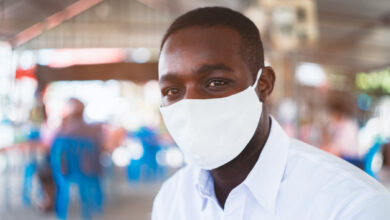Red-listing policy behaviour


Seeing as both responses (our elite in answer to its aides, and the U.K. government in response to would-be travellers from Nigeria) shared the same motive, opportunity, and means, the only question is how the U.K.’s recent imposition of travel restrictions on the country, far less severe than our elite had imposed and still foists on their domestic staff, is described as “racist” by our talking heads, and our elite’s response is still considered “pragmatic” and the “right thing to do”?
One of the first reactions of large sections of the Lagos elite (and I use this broad-brush descriptive advisedly) to the breakout of SARS-CoV-2 (the virus that causes COVID-19) early last year, was to furlough their retinue of helps. Some others chose to quarantine drivers, housekeepers, nannies, gardeners, etc, in their boys’ quarters for the two weeks it then was supposed to take for the disease’s symptoms to manifest, after which they forbade the healthy from further fraternising with potential vectors ― including the former’s immediate family.
This attempt to shelter the domestic affluent and their support infrastructure was a response rich in irony. For most of them, fearing the adverse effect of a lockdown in Europe, had just completed a mass evacuation of their children and wards in school there. But not many were alive to the contradictory thought processes inherent in taking steps to protect themselves from a highly contagious and lethal, in some circumstances, effect of a disease that had reached Europe from China, and which they may have inadvertently imported along with their kids.
And yet, as with much of the discourse around the pandemic, the devil is in the circumstances. For as with their peers in the advanced economies, our elite are not just longer-lived (than the rest of us), but suffer from those ailments, “co-morbidities” they now call them, on which the virus piggybacks to disable (long COVID, especially) and kill: diabetes, obesity, etc. Thus, in the qualified sense of being both more exposed and vulnerable to the new pathogen, they were justified to have acted against their support staff, and in their own narrow interest.
As metaphor, you cannot find a better analogy than these chapter of events for the U.K.’s “red listing” of Nigeria, following the discovery of the markedly pathogenic Omicron variant of COVID-19. The basic statistics of both narratives are mirror images of each other.
The snag, though, with the effective design of proper policy responses, is that they must accommodate as much information as possible. Rarely does good policy work on a wish and a prayer. And in this case, our elite may have excluded from their calculations the fact that the median age down the wealth pyramid in this country is quite low. Nor did they appear to acknowledge the fact that high poverty rates amongst our less well-off compatriots mean that eating habits could not have created a pool of diabetic and obese people at that level significant enough to result in COVID-19-related deaths.
Also Read: Between economic man and the rational voter
Much of that awareness came only later. Because the circumstances of the lower demographic groupings meant they could be infected while showing absolutely no symptom of the disease, most employers insisted on the double jab (as soon as these became available) as condition for lifting the earlier furlough. Aware, too, of the “nature” of the country, they personally drove their wards (for the first time in most cases) to go get the jab ― they could not trust them not to go bring vaccine certifications from “Oluwole”.
As metaphor, you cannot find a better analogy than these chapter of events for the U.K.’s “red listing” of Nigeria, following the discovery of the markedly pathogenic Omicron variant of COVID-19. The basic statistics of both narratives are mirror images of each other.
Africa, on the other hand, loses far more lives a year to other diseases, malaria most obviously, than it does to the coronavirus. For a variety of reasons, including a median age around 20 years old, and the apparent immunity conferred on those who had previously been treated for malaria.
As at end-November, this year, the coronavirus was the leading cause of death in Europe ― helped by a population with a large number of over-65s, diabetic and obese. Besides, better healthcare services/facilities in those places also meant significant numbers of people there living with what were once life-threatening illnesses ― all of whom are vulnerable, directly and indirectly to the pandemic. Africa, on the other hand, loses far more lives a year to other diseases, malaria most obviously, than it does to the coronavirus. For a variety of reasons, including a median age around 20 years old, and the apparent immunity conferred on those who had previously been treated for malaria.
And as our local elite painfully exhibited at the start of the domestic vaccination campaign, our certification processes are slightly more complicated than one would ordinarily expect ― ask anyone who has had to obtain the Yellow Fever vaccination certificate for travel out of the country, then you get a sense of the sheer detail involved.
Seeing as both responses (our elite in answer to its aides, and the U.K. government in response to would-be travellers from Nigeria) shared the same motive, opportunity, and means, the only question is how the U.K.’s recent imposition of travel restrictions on the country, far less severe than our elite had imposed and still foists on their domestic staff, is described as “racist” by our talking heads, and our elite’s response is still considered “pragmatic” and the “right thing to do”?
Uddin Ifeanyi, journalist manqué and retired civil servant, can be reached @IfeanyiUddin.







